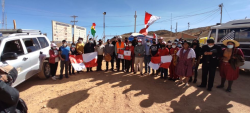Santa Cruz, Bolivia. On October 12th, 2021 leaders of the Comité Cívico Potosinista (COMCIPO) and members of the Municipal Council of Potosi blocked the entranceway to the San Bartolome oxides plant, owned by Canadian company Andean Precious Metals (TSX: APM) in Potosi, Bolivia. They claim that the company’s mining operations are responsible for the ongoing destruction of the Cerro Rico de Potosi — a UNESCO World Heritage Site and sacred to the Indigenous Qaraqara people.
In August, the peak of the mountain collapsed in a dramatic cloud of dust. The site had been listed as a “Heritage in Danger” since 2014 due to the increase in cave-ins. On August 10, the COMCIPO resolved to take action if the Bolivian government doesn’t immediately halt the company’s operations and force them to pay for the environmental damages.
In spite of the collapse and ignoring the COMCIPO’s demands, APM’s subsidiary Empresa Minera Manquiri did not reduce its milling activities and instead, was recently filmed working in zones that had previously caved in. The road blocks come in response to the company’s refusal to meet with the Municipal Council to provide a detailed report on their activities as cave-ins and accidents increase.
Although mineral exploitation on the Cerro Rico has been ongoing to some degree for over 500 years, the last decade and a half of industrial mining have significantly altered the stability of the mountain and produced huge tailings ponds. When U.S-based company Coeur sold its operations in 2019 to Argentum Investments, the President at the time said in an interview that they sped up the sale due to [costly] closure costs. Citizens are concerned that an even smaller company will leave them with an environmental disaster and an important heritage site destroyed.
“It’s clear to us that Manquiri’s operations are damaging the mountain. They need to fulfill their environmental remediation obligations, and quickly,” said Municipal Council President Mirta Guzman Canelas.
Following the road block, four members of the council went on a five-day hunger strike, including Guzman Canelas. For this, Guzman Canelas and her family faced immediate backlash and intimidation.
According to the company’s own technical reporting, over 16 million tonnes have been milled since 2008 when the industrial operations commenced. The mill, which processes 5500tn/day reports to source feed from superficial mineral deposits, but also purchases silver oxides from small-scale mining cooperatives who mine the Cerro Rico and rural areas around it. Over 40% of the current mill feed comes from these small-scale miners whose working conditions are precarious and extremely dangerous.
On October 9, following several reports of continued collapse, elders of the Indigenous Qaraqara nation held a redress ceremony and k’oa offering where they solemnly asked for forgiveness from the sacred mountain for the ongoing damage. For them, the Sumaj Orko (its Quechua name) was a sacred site prior to Spanish colonization where they would practice ceremonies and rites:
“We are here today from the Qaraqara nation and its great Ayllus to ask for forgiveness to our Sumaj Orko for so much suffering. It is our obligation because our blood is here and our brothers are resting in this mountain,”* said one Indigenous elder.
Even as it continues to produce silver doré for U.S refineries, the company refuses to acknowledge the mountain’s important spiritual significance to the Qaraqara nation. In APM’s technical report dated September 1, 2020, there is only one reference to its designation as a UNESCO World Heritage Site, and no recognition of its status as an Indigenous wak’a (sacred site).
Kirsten Francescone from MiningWatch Canada, who has spent several years researching the tragedy and is currently in Bolivia, notes: “As the mountain collapses dramatically before our eyes it is imperative that the company stop denying their responsibility. Their open-pit mining methods and extra-official purchasing are clearly to blame, and they’re going to be on the hook for the costly remediation. Communities are demanding they cease operations and they should take heed.”
For more information or to set up interviews with the COMCIPO or Municipal Council, contact:
-
Kirsten Francescone, Latin American Program Coordinator (Currently on leave and in Bolivia), +59 17 536 5974 (WhatsApp/Signal/Telegram)
*Translation from the original video in Quechua to Spanish generously provided by Wilson Montes
